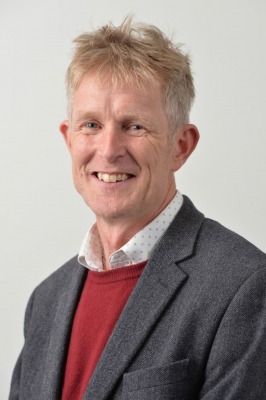Prof Martin Knight
BEng, MSc, PhD, FHEA
Professor of Mechanobiology
Dean for Research (Faculty of Science and Engineering)
Engineering 338, Mile End
| Feedback/ support hours: |
Please make an appointment by email as my diary is heavily booked being faculty Dean for Research and part time. |
| Expertise: |
As a bioengineer, my research is focussed on the development of organ-on-a-chip technology and other complex in vitro models. These in vitro models can transform pre-clinical testing of new drugs and therapeutics, acelerating the delivery of safer, more effective medicines. The models are also helping us to better understand human health and disease. As a professor of 'mechanobiology' I am interested in how living cells and tissues respond to biomechanical forces and how this should be incorporated into organ-chip design. Related to this, my research team examine the role of the cellular structures known as primary cilia. We are investigating structure-function relationships in this poorly understood organelle and whether manipulation of cilia can be used as a therapeutic strategy. I work on a variety of different diseases including osteoarthritis, cancer, atherosclerosis and inflammation and associated tissues/organs such as cartilage, synovium, bone, kidney and artery. |
| Research Centre: | Bioengineering |
| Affiliations: |
Queen Mary Centre for Predictive in vitro Models (Co-Director) Biomedical Engineering Association UK (Chair of Council) Cilia Network UK (Leadership Team) Fellow of the Higher Education Authority |
Brief Biography
Martin Knight is a Professor of Mechanobiology and a Bioengineer based at Queen Mary University of London. His research examines on mechanobiology how living cells and tissues within our bodies sense and respond to mechanical forces with particular focus on organ-chip technology and primary cilia.
Prof Knight has always been interested in biomedical engineering but his first degree was in Mechanical Engineering University of Bath). He then progressed to an MSc in Biomedical Engineering (University of Surrey) and then a PhD at the IRC in Biomedical Materials (Queen Mary University of London). In 2000 he was awarded a prestigious EPSRC Advanced Research Fellowship in cartilage mechanobiology and tissue engineering and was promoted to Reader in 2009 and Professor in 2012.
In the last 5 years, Prof Knight has been particularly active in the development of organ-on-a-chip technology, co-directing the UK Network, the Queen Mary+Emulate Organs-on-chips centre and the Centre for Predictive in vitro Models (www.cpm.qmul.ac.uk). Most recently the team have over £7M for an EPSRC Centre for Doctoral Training in Next Generation Organ-on-a-chip Technology.
Prof Knight has published over 120 papers and attracted over £18M of research funding including project grants from three UK research councils (EPSRC, BBSRC and MRC) as well as EU, Wellcome Trust and other charities.
Prof Knight is the Dean for Research in the faculty of Science and Engineering at Queen Mary University of London: www.seresearch.qmul.ac.uk
He is also actively involved in teaching biomedical engineering and has a strong interest in promoting the public understanding of science. In 2022, Prof Knight was elected to the Chair of Council for the UK Biomedical Engineering Association.
Outside work Martin enjoys the 'great outdoors' and has had many enjoyable expeditions to wilderness areas including Alpine treks, canoeing in the Everglades, cycling in the Hebrides and others, many of these with his family.
For the last 20 years, he has chosen to work 80% (4 days a week) in order to spend time looking after his children and maintain a healthy work-life balance. More recently he uses his one day a week to volunteer for the Woodland Trust, conduct river invertebrate surveys reporting to the Environment Agency, make ceramics, cycle the Chilterns and grow the best runner beans!
Prof Knight has always been interested in biomedical engineering but his first degree was in Mechanical Engineering University of Bath). He then progressed to an MSc in Biomedical Engineering (University of Surrey) and then a PhD at the IRC in Biomedical Materials (Queen Mary University of London). In 2000 he was awarded a prestigious EPSRC Advanced Research Fellowship in cartilage mechanobiology and tissue engineering and was promoted to Reader in 2009 and Professor in 2012.
In the last 5 years, Prof Knight has been particularly active in the development of organ-on-a-chip technology, co-directing the UK Network, the Queen Mary+Emulate Organs-on-chips centre and the Centre for Predictive in vitro Models (www.cpm.qmul.ac.uk). Most recently the team have over £7M for an EPSRC Centre for Doctoral Training in Next Generation Organ-on-a-chip Technology.
Prof Knight has published over 120 papers and attracted over £18M of research funding including project grants from three UK research councils (EPSRC, BBSRC and MRC) as well as EU, Wellcome Trust and other charities.
Prof Knight is the Dean for Research in the faculty of Science and Engineering at Queen Mary University of London: www.seresearch.qmul.ac.uk
He is also actively involved in teaching biomedical engineering and has a strong interest in promoting the public understanding of science. In 2022, Prof Knight was elected to the Chair of Council for the UK Biomedical Engineering Association.
Outside work Martin enjoys the 'great outdoors' and has had many enjoyable expeditions to wilderness areas including Alpine treks, canoeing in the Everglades, cycling in the Hebrides and others, many of these with his family.
For the last 20 years, he has chosen to work 80% (4 days a week) in order to spend time looking after his children and maintain a healthy work-life balance. More recently he uses his one day a week to volunteer for the Woodland Trust, conduct river invertebrate surveys reporting to the Environment Agency, make ceramics, cycle the Chilterns and grow the best runner beans!





